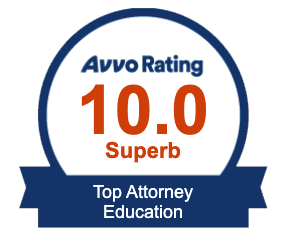For some parents, a decision must be made whether to file due process and/or attempt mediation of a special education dispute. This decision can be difficult for a number of reasons. I will give you some of these reasons by example.
I recently filed for a due process hearing concerning a 2nd grade child with Down’s Syndrome that the school system wants to place in a self-contained mild intellectually disabled class. This child has always been served the majority of the day in regular education and pull-out classes (resource) but the school district dug in its heels in maintained that the child should be served in a self-contained program. Some of the reasons for the school system’s proposed educational placement in a self-contained program are: (1) child will learn more and better in a self-contained program; (2) child sticks out tongue and is exhibiting behaviors that require self-contained classroom; and (3) the school system will not provide a paraprofessional for child in regular education classes. The parents strongly disagree with the school system’s educational placement and now are facing a due process hearing.
The administrative law judge assigned to case stated in a pre-trial order that the parties’ are strongly encouraged to mediate the dispute. When a judge asks the parties to try to settle any case, an attorney should advise his or her clients of the judge’s preference and try to arrange for mediation. In Georgia, however, mediation can be a slippery slope for parents. The State Board of Education has a list of mediators and one will be assigned to a case when requested by either the parent or school system. The problem is that most of the listed mediators may be biased, lack proper credentials and training as a mediator, lack expertise in special education matters, or are unable to use their skills effectively in mediation. In this case, the first assigned mediator had worked for a school system for more than 30 years and was appointed by the school system to try to resolve special education disputes in a resolution meeting. When I learned that this mediator had worked for a school system for more than 30 years and was considered biased by a number of advocated and special education attorneys, I reached the unescapable conclusion that the mediator will not be helpful resolving this dispute. I informed that school system that the assigned mediator was not acceptable. Another mediator was assigned, but she, too, had serious flaws. I asked the school system’s attorney if we could use a mediator the Justice Center of Atlanta for this case. The school system’s attorney contacted the Center and asked if Edith Prim, who is a highly reputable and competent special education mediator, would accept this case. Ms. Prim agreed. The cost of Edith Prim’s services for one day is $1,500.00. There is no cost for an assigned medator from the Board of Education. So if you want a highly trained and experienced special education mediator, either the school system is willing to pay for Edith Prim or the parties can hire an independent mediator at the equal expense of both parties.
We spent entire day in mediation with Edith Prim but the parties were unable to reach an agreement. This is not to say that mediation was a failure. The parties presented different proposals and got closer to a middle ground than the position taken by the school system prior to the parents filing for due process. Most of my special education mediations at the Justice Center of Atlanta have resulted in favorable settlements for parents. But ever once in a while the parties cannot reach a compromise. There is nothing wrong with the system when mediation does not resolve the dispute. It just means that for whatever reason, the parties in a particular case are unable to reach a compromise. The very nature of mediation is for the parties to attempt to compromise their differences. There are pros and cons to compromise. In the end, the other option is to take a case to a due process hearing. You cannot predict what any administrative judge will decide a special education case. Thus, the school system and parents throw the dice and hope that their respective positions and arguments are adopted by the administrative law judge.
Mediation should be taken seriously by all parties. And when taken seriously, mediation works in most circumstances. But if you believe that your position on any disputed issue cannot be compromised, then mediation may not be for you.

